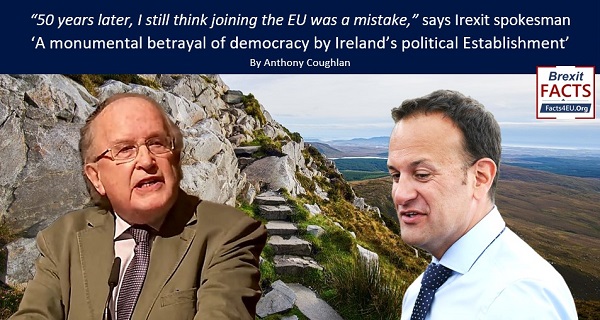“50 years later, I still think joining the EU was a mistake,” says Irexit spokesman
It's easy to forget the Irish twice voted against EU treaties and were told to vote again

Montage © Facts4EU.Org 2023
Facts4EU.Org and CIBUK.Org are pleased to present a guest article from the Republic of Ireland
Below we publish the thoughts of a well-informed Irishman on his own country’s journey in its relationship with the European Union. He covers many important issues which have resonance for British people in the light of Brexit.
Emeritus Professor Anthony Coughlan is Spokesman for ‘The National Platform EU Research and Information Centre’, Dublin. The organisation advocates a Europe of independent, democratic, cooperating nation states.
With Europhile politicians such as Leo Varadkar in charge in the Republic of Ireland, it's easy to forget that the Irish people voted to reject two key EU treaties in two referenda.
As they 'voted the wrong way' they were of course made to vote again until they got the decision right. Given this background, the perspective of a very experienced Irish eurosceptic should be of interest.
We hope readers enjoy Professor Coughlan's excellent article as much as we did on reading it.
Photo: Irish Taoiseach Leo Varadkar

‘A monumental betrayal of democracy by Ireland’s political Establishment’
By Anthony Coughlan
In the 1972 Accession referendum that brought us into the EEC, the Irish Congress of Trade Unions, the Labour Party and the two recently divided Sinn Fein parties urged a No vote. But when it came to the poll it looked as if most voters said to themselves that if Fianna Fail and Fine Gael – traditional political opponents – recommended joining, it must be a good thing. The huge Yes vote was equivalent to the combined vote of the State’s two biggest parties.
That was then – this is now
Would people have voted the same way if they could have seen how the EEC/EC/EU has developed in the half century since? I would myself, but it is idle to speculate. What matters is where we are now and what the future holds.
What has happened in between has been a monumental betrayal of democracy by Ireland’s political Establishment. Whether one regards joining the EEC as a mistake or not, membership was genuinely endorsed by Irish voters in 1973.
The Irish people rejected the Nice and Lisbon Treaties but were ignored
But when voters rejected the Nice Treaty in 2001 and the Lisbon Treaty in 2008 two things had changed: the Irish public showed clearly they were concerned at the direction of travel, but our Establishment was no longer willing to turn back, no matter what the people wanted.
The consequences of the rejection of the People’s instincts - and, more importantly, their instructions - have been profound. One was joining the single currency, which led to the reckless credit expansion by the Irish banks and the 2009 financial crisis.
The other has been the constitutional revolution by stealth that has made us citizens of a Federal European Union, effectively a United States of Europe, without most of us realising it or thinking through its implications.
Photo credit: The National Platform - click to enlarge
The ‘Federation of Europe’
The 1950 Schuman Declaration, which the EU celebrates each year on May 9th, Europe Day, described the first supranational treaty establishing the European Coal and Steel Community as “a first step in the federation of Europe”. A Federation is a State and to advance that goal has been the purpose of the eight EU-related referendums we have had since 1973. Do people remember the monstrous assault on national democracy across Europe which brought the EU Constitution, that is now part of our Constitution, into being?
In 2004 there was the “Treaty Establishing a Constitution for Europe”, whose first article stated: “This Constitution establishes the European Union” – clearly a constitutionally different EU from what was called the EU previously. When the French and Dutch peoples rejected this in referendums, it was 99% repackaged three years later as the Lisbon Treaty. Only Ireland was allowed a referendum on that. And when we voted to reject it in 2008 we were made to vote again in 2009 on exactly the same treaty to get a different result.
The transfer of powers to the EU
The EU Constitution implemented by the Lisbon Treaty abolished the European Community that had been the repository of supranational powers up to then. It transferred those powers to the new European Union which Lisbon established, giving it legal personality for the first time. It gave this new EU powers over foreign and security policy, and crime and justice. It gave it the power to decide our human rights. It put EU law-making substantially on a population basis to the benefit of the big States. And it made us all real citizens of the post-Lisbon EU so that we all now have two citizenships, with State sovereignty divided between the supranational Federal and the National/Regional level, just as in such classical Federal States as the USA and Germany.
One can only be a citizen of a State and all States consist of their citizens. The prime civic duty of each of us, with our two citizenships, is to obey EU law and national law. In any conflict between the two, European law has primacy.
Where are we now, post-Brexit?
European Union membership has brought benefits of course, just as our membership of the British Union did, but on any objective assessment the costs now outweigh the benefits. We are now net contributors to, rather than beneficiaries from, the EU Budget.
Today Ireland does more of its foreign trade with North America and the UK than it does with the continental EU. We really are closer to Boston than Berlin.
The policy trajectory
Outside the EU we would get back the power to make our own laws, regain our own currency and with it control of either our rate of interest or our exchange rate. We would get back our valuable sea fisheries and our foreign policy independence.
What of Partition? Can it ever be in Britain’s security interest – or indeed England’s – to facilitate a United Ireland as a member State of a European Federation dominated by Franco-Germany? I doubt it. If that is so, then anyone who aspires to a reunified Ireland should logically be advocating Irexit – not least as a meaningful gesture to the “Britishness” of Northern Unionists.
We need to look more objectively at the post-Lisbon EU and its policy trajectory. That means looking at it more critically than is our wont.
The author: Anthony Coughlan is Associate Professor Emeritus in Social Policy at Trinity College Dublin
[NOTE: Facts4EU.Org inserted sub-headings into Professor Coughlan's article for ease of reading and also emboldened some of his key points for those readers who are short of time. Otherwise the text is unaltered.]
Observations
An Irish eurosceptic perspective
From time to time Facts4EU.Org brings readers perspectives on the EU from other countries. We are outward-looking internationally, along with CIBUK of which we are an affiliated organisation, and look to support euroscepticism wherever it may be.
An economist by profession, Professor Coughlan has been a long-standing opponent of EU integration on democratic and internationalist grounds and has written and spoken widely on EU-related matters. Back at the time of the UK's first EU Referendum in 1975, he shared platforms with former Labour Ministers Peter Shore and Tony Benn and Conservative Minister Sir Richard Body.
He was an active campaigner in Republic of Ireland referendums on its 1972 EEC Accession Treaty and on the 1987 Single European Act Treaty, the 1992 Maastricht Treaty, the 1998 Amsterdam Treaty, the 2001 and 2002 referendums on the Nice Treaty, the 2008 and 2009 referendums on the Lisbon Treaty and the 2012 Stability Mechanism Treaty. He also brought a constitutional action before the Irish Supreme Court in relation to fair procedures in EU-related referendums and he won the case.
More recently Professor Coughlan was invited to make a submission to the Irish Senate Special Select Committee on the Withdrawal of the UK from the European Union in June 2017; and his submission to the UK House of Commons Northern Ireland Affairs Committee in October of that year makes points that are broadly similar.
Facts4EU.Org would like to thank Professor Coughlan for his permission to publish this article.
Facts4EU.Org needs you today
We are a 'not for profit' team (we make a loss) and any payment goes towards the actual work, not plush London offices, lunch or taxi expenses, or other luxuries of some organisations.
We badly need more of our thousands of readers to become members, to support this work. Could this be you, today? It's quick and easy, we give you a choice of two highly secure payment providers, and we do NOT ask you for further support if you pay once. We just hope you keep supporting us. Your membership stays anonymous unless you tell us otherwise.
Please don't assume that other people will keep us going - we don't receive enough to survive and we need your help today. Could you help us? We rely 100% on public contributions from readers like you.
If you believe in a fully-free, independent, and sovereign United Kingdom, please join now by clicking on one of the links below or you can use our Support page here. You will receive a personal, friendly ‘thank you’ from a member of our team within 24 hours. Thank you.
[ Source: Anthony Coughlan ] Politicians and journalists can contact us for details, as ever.
Brexit Facts4EU.Org, Thurs 12 Jan 2023
Click here to go to our news headlines
Please scroll down to COMMENT on the above article.
And don't forget to actually post your message after you have previewed it!
Since before the EU Referendum, Brexit Facts4EU.Org
has been the most prolific researcher and publisher of Brexit facts in the world.
Supported by MPs, MEPs, & other groups, our work has impact.
We think facts matter. Please donate today, so that we can continue to ensure a clean Brexit is finally delivered.
Paypal Users Only - Choose amount first
Quick One-off
Monthly



Something to say about this? Scroll down for reader comments